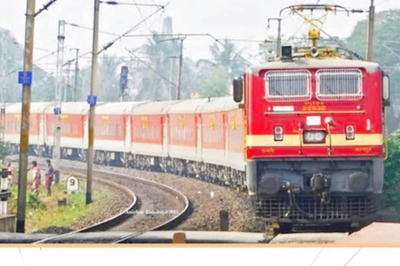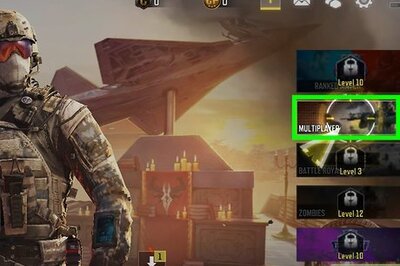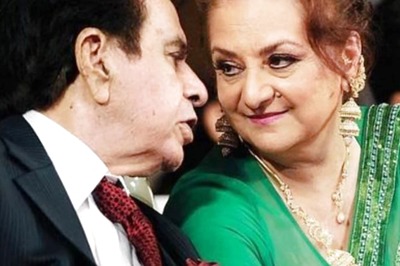
views
Yangon: Myanmar's military government freed its archrival, democracy leader Aung San Suu Kyi, on Saturday after her latest term of detention expired. Several thousand jubilant supporters streamed to her residence.
A smiling Suu Kyi, wearing a traditional jacket and a flower in her hair, appeared at the gate of her compound as the crowd chanted, cheered and sang the national anthem.
"If we work in unity, we will achieve our goal. We have a lot of things to do," she told the well-wishers, who quickly swelled to as many as 5,000. Speaking briefly in Burmese, she said they would see each other again on Sunday at the headquarters of her political party.
The 65-year-old Nobel Peace Prize laureate, whose latest period of detention spanned 7-1/2 years, has come to symbolize the struggle for democracy in the Southeast Asian nation ruled by the military since 1962.
The release from house arrest of one of the world's most prominent political prisoners came a week after an election that was swept by the military's proxy political party and decried by Western nations as a sham designed to perpetuate authoritarian control.
Supporters had been waiting most of the day near her residence and the headquarters of her party. Suu Kyi has been jailed or under house arrest for more than 15 of the last 21 years.
As her release was under way, riot police stationed in the area left the scene and a barbed-wire barricade near her residence was removed, allowing the waiting supporters to surge forward.
Her release was immediately welcomed by world leaders and human rights organizations.
President Barack Obama called Suu Kyi "a hero of mine" said the United States "welcomes her long overdue release."
"Whether Aung San Suu Kyi is living in the prison of her house, or the prison of her country, does not change the fact that she, and the political opposition she represents, has been systematically silenced, incarcerated, and deprived of any opportunity to engage in political processes," he said in a statement.
British Prime Minister David Cameron also said the release was long overdue.
"Aung San Suu Kyi is an inspiration for all of us who believe in freedom of speech, democracy and human rights," he said in a statement.
"It is now crucial that Aung San Suu Kyi has unrestricted freedom of movement and speech and can participate fully in her country's political process," European Commissioner Jose Manuel Barroso said.
Critics allege the Nov. 7 elections were manipulated to give the pro-military party a sweeping victory. Results have been released piecemeal and already have given the junta-backed Union Solidarity and Development Party a majority in both houses of Parliament.
The last elections in 1990 were won overwhelmingly by Suu Kyi's National League for Democracy party, but the military refused to hand over power and instead clamped down on opponents.
It is unlikely the ruling generals will allow Suu Kyi, who drew huge crowds of supporters during her few periods of freedom, to actively and publicly pursue her goal of bringing democracy to Myanmar, formerly known as Burma.
But some see hope in her release.
"There is no formal opposition (in Myanmar) so her release is going to represent an opportunity to re-energize and reorganize this opposition. So in that sense, of revitalizing the opposition in some concrete way, Suu Kyi's release is going to be very pivotal," said Muang Zarni, an exiled dissident and Myanmar research fellow at the London School of Economics.
Suu Kyi — who was barred from running in this month's elections — plans to help probe allegations of voting fraud, according to Nyan Win, who is a spokesman for her party, which was officially disbanded for refusing to reregister for this year's polls.
Awaiting her release in neighboring Thailand was the younger of her two sons, Kim Aris, who is seeking the chance to see his mother for the first time in 10 years. Aris lives in Britain and has been repeatedly denied visas.
Her late husband, British scholar Michael Aris, raised their sons in England. Their eldest son, Alexander Aris, accepted the Nobel Peace Prize on his mother's behalf in 1991 and reportedly lives in the United States.
Here are some key events in the life of Suu Kyi, whose struggle for democracy in Myanmar, also called Burma, has made her one of the world's most famous political prisoners.
June 19, 1945: Born in Yangon, then called Rangoon. She is the daughter of national hero Gen. Aung San and Daw Khin Kyi, also a prominent public figure.
July 1947: Aung San and six members of his interim government are assassinated by rivals. Suu Kyi is 2.
1960: After finishing high school, Suu Kyi leaves for further study in New Delhi, where her mother is Burma's ambassador. She later moves to England to study at Oxford University.
1972: Marries Michael Aris, an Oxford University academic. Son Alexander born in 1973, son Kim born in 1977.
April 1988: Suu Kyi returns home to attend to her ailing mother just as pro-democracy protests erupt against the military junta. Her mother dies later that year.
Aug. 8-11, 1988: Mass demonstrations throughout Burma. Security forces open fire on demonstrators. Hundreds are killed.
September 1988: Suu Kyi helps found opposition party, the National League for Democracy.
June 1989: The government renames the country Myanmar and the capital Yangon.
July 1989: Suu Kyi, an increasingly outspoken critic of the junta, and her deputy, Tin Oo, are put under house arrest.
May 1990: The junta calls general elections. Suu Kyi's party wins a landslide victory, but the military refuses to hand over power.
October 1991: Suu Kyi is awarded the Nobel Peace Prize for her peaceful struggle against the regime.
July 1995: Suu Kyi is released from house arrest but remains in Myanmar, fearing she will never be let back into the country if she leaves.
March 1999: Aris, who has not seen his wife since 1995 because the junta repeatedly denied him a visa, dies of cancer in England.
September 2000: Suu Kyi is placed under house arrest after attempting to leave Yangon for a political meeting.
May 2002: Suu Kyi is released from house arrest.
May 2003: Suu Kyi is put back under house arrest. She is taken into "protective custody" after her motorcade is ambushed by a government-backed mob.
August 2007: Protests start over fuel price increases, then swell into the largest pro-democracy demonstrations since 1988.
Aug. 11, 2009: Suu Kyi's detention is extended by 18 months when a court convicts her of violating her house arrest by briefly sheltering an American intruder who swam to her house uninvited.
Nov. 7, 2010: Myanmar's first elections in 20 years. Pro-junta party wins landslide victory in polls critics say were rigged and rampant with fraud.
Nov. 13, 2010: Suu Kyi's detention expires and she is freed.



















Comments
0 comment